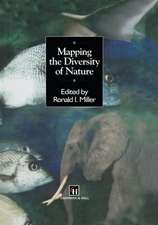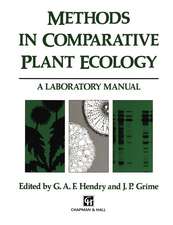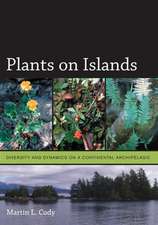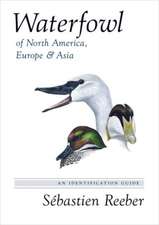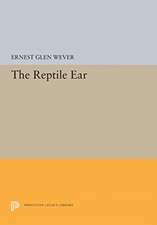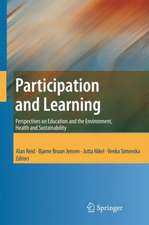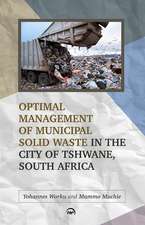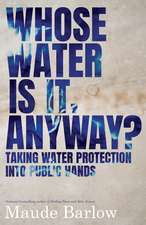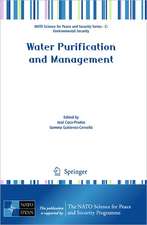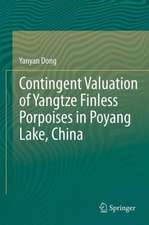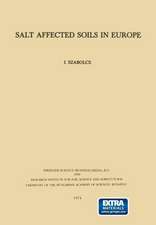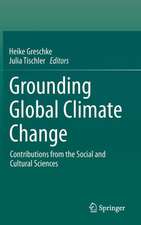Economic Sustainability and Environmental Protection in Mediterranean Countries through Clean Manufacturing Methods: NATO Science for Peace and Security Series C: Environmental Security
Editat de José Coca-Prados, Gemma Gutiérrez-Cervellóen Limba Engleză Hardback – 16 oct 2012
| Toate formatele și edițiile | Preț | Express |
|---|---|---|
| Paperback (1) | 939.33 lei 6-8 săpt. | |
| SPRINGER NETHERLANDS – 16 oct 2012 | 939.33 lei 6-8 săpt. | |
| Hardback (1) | 945.14 lei 6-8 săpt. | |
| SPRINGER NETHERLANDS – 16 oct 2012 | 945.14 lei 6-8 săpt. |
Din seria NATO Science for Peace and Security Series C: Environmental Security
- 18%
 Preț: 1106.00 lei
Preț: 1106.00 lei - 15%
 Preț: 659.70 lei
Preț: 659.70 lei - 18%
 Preț: 999.60 lei
Preț: 999.60 lei - 18%
 Preț: 1221.07 lei
Preț: 1221.07 lei - 18%
 Preț: 1220.75 lei
Preț: 1220.75 lei - 18%
 Preț: 940.39 lei
Preț: 940.39 lei - 18%
 Preț: 1216.78 lei
Preț: 1216.78 lei - 18%
 Preț: 1232.71 lei
Preț: 1232.71 lei - 18%
 Preț: 1818.02 lei
Preț: 1818.02 lei - 18%
 Preț: 1833.95 lei
Preț: 1833.95 lei - 18%
 Preț: 1231.47 lei
Preț: 1231.47 lei - 18%
 Preț: 942.44 lei
Preț: 942.44 lei - 18%
 Preț: 1218.06 lei
Preț: 1218.06 lei - 18%
 Preț: 1383.00 lei
Preț: 1383.00 lei - 15%
 Preț: 664.29 lei
Preț: 664.29 lei - 18%
 Preț: 1220.88 lei
Preț: 1220.88 lei - 24%
 Preț: 1040.01 lei
Preț: 1040.01 lei - 18%
 Preț: 1222.80 lei
Preț: 1222.80 lei - 18%
 Preț: 1220.75 lei
Preț: 1220.75 lei - 18%
 Preț: 1224.85 lei
Preț: 1224.85 lei - 18%
 Preț: 1224.85 lei
Preț: 1224.85 lei - 18%
 Preț: 1224.68 lei
Preț: 1224.68 lei - 18%
 Preț: 963.15 lei
Preț: 963.15 lei - 18%
 Preț: 1229.10 lei
Preț: 1229.10 lei - 18%
 Preț: 1222.49 lei
Preț: 1222.49 lei - 18%
 Preț: 1223.74 lei
Preț: 1223.74 lei - 18%
 Preț: 1213.65 lei
Preț: 1213.65 lei - 18%
 Preț: 956.33 lei
Preț: 956.33 lei - 18%
 Preț: 1235.43 lei
Preț: 1235.43 lei - 18%
 Preț: 940.39 lei
Preț: 940.39 lei - 18%
 Preț: 1210.63 lei
Preț: 1210.63 lei - 18%
 Preț: 1219.63 lei
Preț: 1219.63 lei - 18%
 Preț: 1225.48 lei
Preț: 1225.48 lei - 18%
 Preț: 1228.75 lei
Preț: 1228.75 lei - 18%
 Preț: 1228.62 lei
Preț: 1228.62 lei - 18%
 Preț: 1222.94 lei
Preț: 1222.94 lei - 18%
 Preț: 962.98 lei
Preț: 962.98 lei - 18%
 Preț: 1218.06 lei
Preț: 1218.06 lei - 15%
 Preț: 643.99 lei
Preț: 643.99 lei - 18%
 Preț: 1220.12 lei
Preț: 1220.12 lei - 18%
 Preț: 1233.52 lei
Preț: 1233.52 lei - 18%
 Preț: 946.24 lei
Preț: 946.24 lei - 18%
 Preț: 1218.21 lei
Preț: 1218.21 lei - 18%
 Preț: 953.65 lei
Preț: 953.65 lei
Preț: 945.14 lei
Preț vechi: 1152.61 lei
-18% Nou
Puncte Express: 1418
Preț estimativ în valută:
180.85€ • 188.82$ • 149.68£
180.85€ • 188.82$ • 149.68£
Carte tipărită la comandă
Livrare economică 05-19 aprilie
Preluare comenzi: 021 569.72.76
Specificații
ISBN-13: 9789400750784
ISBN-10: 9400750781
Pagini: 168
Ilustrații: IX, 155 p. 96 illus.
Dimensiuni: 155 x 235 x 15 mm
Greutate: 0.44 kg
Ediția:2013
Editura: SPRINGER NETHERLANDS
Colecția Springer
Seria NATO Science for Peace and Security Series C: Environmental Security
Locul publicării:Dordrecht, Netherlands
ISBN-10: 9400750781
Pagini: 168
Ilustrații: IX, 155 p. 96 illus.
Dimensiuni: 155 x 235 x 15 mm
Greutate: 0.44 kg
Ediția:2013
Editura: SPRINGER NETHERLANDS
Colecția Springer
Seria NATO Science for Peace and Security Series C: Environmental Security
Locul publicării:Dordrecht, Netherlands
Public țintă
GraduateCuprins
Preface.- Cleaner Production in Industry: Capacity Building and Implementation.- Recovery and Recycling of Industrial Wastewater by Hybrid Processes.- Treatment of Oily Wastewater by Membrane Hybrid Processes.- Cuben, a Novel Bioreactor for the Removal of Nutrients: Performance Evaluation.- Activated Carbon Adsorption and Chemical Regeneration in the Food Industry.- Hybrid Processes for the Treatment of Leachate from Landfills.- Textile Wastewater Treatment and Recycling.- Changes in Groundwater Salinity and Nitrate Concentrations due to Aquifer Recharge by Treated Wastewater: Korba Case Study.- Index.-
Notă biografică
This volume, with contributions from a team of multi-disciplinary team experts, addresses the economic sustainability and clean manufacturing methods to deal with the challenges that water scarcity and water quality are imposing on many countries, particularly on Mediterranean arid areas, that are threatening their economic and social development. Water plays a crucial role in industry, agriculture and daily life. Its use has increased ten-fold between 1900 and 2000. On a global scale, about 70 % of clean water from available sources is used for agricultural purposes, primarily irrigation, the rest of it being used for domestic and industrial purposes. With the actual demographic and economic trends, it is expected that by 2025, two-thirds of the world population will live in water-stressed areas and it is expected a 40 % increase in water consumption.
Textul de pe ultima copertă
This volume, with contributions from a team of multi-disciplinary team experts, addresses the economic sustainability and clean manufacturing methods to deal with the challenges that water scarcity and water quality are imposing on many countries, particularly on Mediterranean arid areas, that are threatening their economic and social development. Water plays a crucial role in industry, agriculture and daily life. Its use has increased ten-fold between 1900 and 2000. On a global scale, about 70 % of clean water from available sources is used for agricultural purposes, primarily irrigation, the rest of it being used for domestic and industrial purposes. With the actual demographic and economic trends, it is expected that by 2025, two-thirds of the world population will live in water-stressed areas and it is expected a 40 % increase in water consumption.
Caracteristici
The book provides a realistic background on the role of cleaner production in industrial processes, with the goal of reducing/recycling wastewater It covers several wastewater treatment processes from an academic and industrial perspective, with special attention to hybrid processes Examples of industrial wastes and disposal methods in the food and textile industries, landfill disposal and aquifers are presented Includes supplementary material: sn.pub/extras

